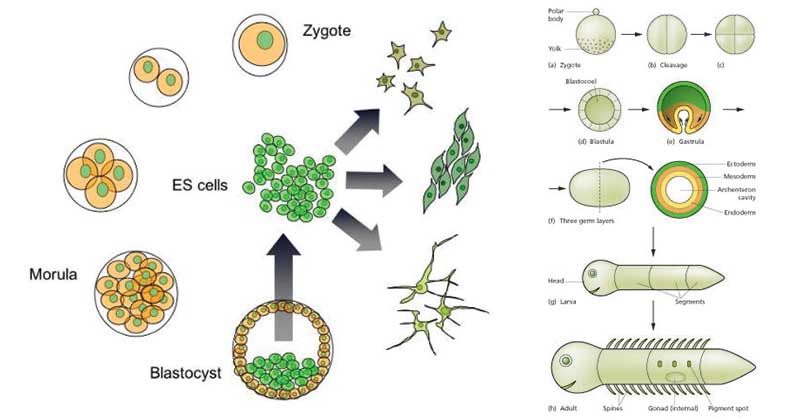Interesting Science Videos
What is Developmental Biology?
- It is the field of biology that studies the processes by which multicellular organisms grow and develop, controlled by their genes.
- It involves the study of mechanisms of development, differentiation, and growth in animals and plants at the molecular, cellular, genetic and evolutionary levels.
- It also encompasses the biology of regeneration, asexual reproduction, metamorphosis, and the growth and differentiation of stem cells in the adult organism.
- The study of development has become essential for understanding any other area of biology.

Image Source: Wikipedia and Researchgate
Interrelated Fields
It is one of the fastest-growing and most exciting fields in biology, creating a framework that integrates:
- Molecular biology
- Physiology
- Cell biology
- Anatomy
- Cancer research
- Neurobiology
- Immunology
- Ecology
- Evolutionary biology
Areas of Research
- Molecular genetics of development
- Control of gene expression
- Cell interactions and cell-matrix interactions
- Mechanisms of differentiation
- Growth factors and oncogenes
- Regulation of stem cell populations
- Evolution of developmental control
- Gametogenesis and fertilization
Other areas of particular emphasis include transcriptional control mechanisms, embryonic patterning, cell-cell interactions, growth factors, and signal transduction, and regulatory hierarchies in developing plants and animals.
Significance of Developmental Biology Studies
- It helps to explain how a variety of interacting processes generate an organism’s heterogeneous shapes, size, and structural features that arise on the trajectory from embryo to adult, or more generally throughout a life cycle.
- It helps to understand the molecular, genetic, cellular, and integrative aspects of building an organism.
- Knowledge of normal developmental processes can aid in the understanding of developmental abnormalities and other conditions such as cancer.
- Philosophers of biology have shown renewed interest in developmental biology due to the potential relevance of development for understanding evolution and the theme of reductionism in genetic explanations.
Applications
Developmental Biology enquires about the fundamental processes that underpin the fertilization of an egg cell and its step-by-step transformation into the fascinating complexity of a whole organism which renders many applications in different fields.
In Fertility Clinics:
- Studying the underlying processes of fertilization has provided the foundations for much of what fertility clinics can do these days.
- Developmental biology investigates how fertilized egg cells divide in regulated manners to grow into full-size bodies, how the cells formed in this process communicate in meaningful ways to become different from each other, migrate, change shape and attach to each other, thus assembling into tissues and complex organs.
In Tissue Engineering:
- ‘Tissue engineering’, which aims to grow replacement tissues in a plastic dish, is essentially guided by DB research.
- In cancer, cells lose their identity, divide excessively, detach from their local environments and migrate to form metastases.
- Much of this understanding that can instruct cures to contain these aberrant cells, comes from DB research.
- Tissues keep so-called stem cells which can be re-activated in orderly manners to divide and grow replacement tissues.
- There are high hopes from stem cell research, for example, to replace cartilage in arthritis or damaged discs, or brain cells in dementia, much of which is guided by the vast knowledge gained through developmental biology.
In Breeding Programs:
- For example, understanding plant development provides a means to speed up breeding processes, such as optimizing root systems, plant size or flowering time, thus contributing to the efforts of achieving sustainable food security in times of over-population.
In understanding factors influencing development:
- Understanding environmental influences on development, such as temperature-dependent sex determination in turtles, has enormous importance for conservation biology, especially in times of increasing pollution and global warming.
References
- https://www.nature.com/subjects/developmental-biology
- https://www.journals.elsevier.com/developmental-biology
- https://www.sciencedaily.com/terms/developmental_biology.htm
- https://plato.stanford.edu/entries/biology-developmental/
- https://www.openaccessgovernment.org/developmental-biology-important/41386/
- Gilbert SF. Developmental Biology. 6th edition. Sunderland (MA): Sinauer Associates; 2000. Available from: https://www.ncbi.nlm.nih.gov/books/NBK9983/
